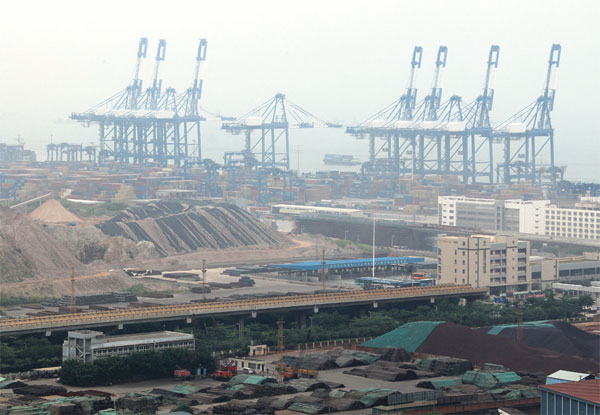- Golden age on horizon for SARs
-
Source :China Daily
The next 35 years will see Guangdong ties pushed by 'intelligence', in which HK and Macao have a unique edge
The "golden age" of Hong Kong and Macao is coming as the two SARs will play a more important role in cooperation with Guangdong province over the next 35 years, experts told a symposium on Friday, while also warning about challenges still ahead.
In the past 35 years, collaboration between the two SARs and Guangdong province relied on hard labor, noted Zhang Yansheng, secretary-general of the Academic Committee of National Development and Reform Commission.

Increased cooperation between Hong Kong, Macao and other Pearl River Delta cities is crucial for the region's future development.
"Things are changing, however," Zhang said in addressing the Guangdong-Hong Kong-Macao Cooperation Symposium at Central.
"In the next 35 years, trilateral cooperation will be pushed by 'intelligence', in which Hong Kong and Macao have unique advantages."
Open markets, transparent and orderly social governance as well as sound environment of rule of law will make the two SARs more important, with increasing opening up and reform on the mainland, Zhang said.
"A golden age for Hong Kong and Macao is coming," he said.
His views were echoed by Zhang Yuge, Economic and Social Development Research Centre director at the China Development Institute, a Shenzhen-based think tank.
"There are many platforms in the cooperation between Guangdong, Hong Kong and Macao, including strategy, policy, innovation, decision-making and operation platforms," he said. "The important thing is to integrate these platforms into a complete system."
In December, the central government officially approved the Guangdong Free Trade Zone (FTZ), covering Qianhai in Shenzhen, Hengqin in Zhuhai, Nansha in Guangzhou, together with Baiyun Airport Comprehensive Bonded Zone, also in Guangzhou. The FTZ is expected to further strengthen cooperation and exchange between Guangdong and the two SARs.
Spurred by the news of the FTZ, the number of enterprises registering in Qianhai surged, with 1,800 arriving last month alone, pushing the total figure to more than 21,600. More than 1,000 Hong Kong companies have registered in the zone so far.
Witman Hung, Qianhai's chief liaison officer for Hong Kong, said Qianhai will further ensure the implementation of its innovative policies to facilitate business operation of Hong Kong firms.
He said Qianhai has two roles to play in cooperation with Hong Kong. "The first one is that it is an extension of Hong Kong in both land and talents. Second, it acts as a bridge for Hong Kong and overseas companies to explore the mainland market."
Meanwhile, some scholars warned that cooperation between Guangdong and Hong Kong still faces challenges in terms of willingness, capability and resources.
Wang Yongcheng, professor at Shenzhen University's Contemporary Chinese Politics Research Institute, said common interests of the two sides are going from complementary to substitutive, which reduces their willingness to cooperate.
The cooperation model is also deviating from its original market-oriented nature to being more government-led, dampening enterprises' enthusiasm and affecting the cooperation capability of the two areas, Wang told the forum.
"In terms of resources, Hong Kong government does not have much to allocate, while for Guangdong province, the government may not want to use the money in the place that is not in its interest, despite owning abundant financial resources."
The two-hour event also featured the release of a book, titled "Report on Cooperation and Development of Guangdong, Hong Kong and Macao," published by the China Academy of Culture.
2015-02-14 16:00:00Attachment Download

 粤公网安备 44030502003702号
粤公网安备 44030502003702号